 Petzlover
Petzlover Karelo-Finnish Laika is originated from Russia but Muggin is originated from United States. Karelo-Finnish Laika may grow 34 cm / 14 inches higher than Muggin. Karelo-Finnish Laika may weigh 8 kg / 17 pounds lesser than Muggin. Both Karelo-Finnish Laika and Muggin has same life span. Both Karelo-Finnish Laika and Muggin has almost same litter size. Karelo-Finnish Laika requires Low Maintenance. But Muggin requires High Maintenance
Karelo-Finnish Laika is originated from Russia but Muggin is originated from United States. Karelo-Finnish Laika may grow 34 cm / 14 inches higher than Muggin. Karelo-Finnish Laika may weigh 8 kg / 17 pounds lesser than Muggin. Both Karelo-Finnish Laika and Muggin has same life span. Both Karelo-Finnish Laika and Muggin has almost same litter size. Karelo-Finnish Laika requires Low Maintenance. But Muggin requires High Maintenance
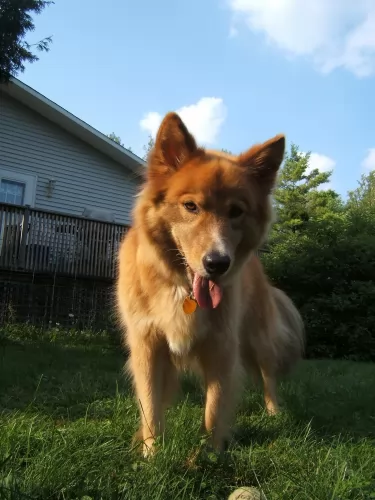 The Karelo Finnish Laika is a Spitz type hunting dog from the Karelia area of Russia.Some people say the dog developed in Sweden. The dog is from a group of ‘Laika’ breeds and has that typical Spitz-type look – the sharpish face, the erect ears and the tail which curls over the back.
The Karelo Finnish Laika is a Spitz type hunting dog from the Karelia area of Russia.Some people say the dog developed in Sweden. The dog is from a group of ‘Laika’ breeds and has that typical Spitz-type look – the sharpish face, the erect ears and the tail which curls over the back.
This attractive dog was developed as a hunting dog, and has a thick, weatherproof coat.The Karelo-Finnish Laika breed developed because people wanted a smaller sized hunting dog that could cope well with the weather, and these Laika dogs matched well.
The breed is ancient – centuries old, and after dying out in numbers during the second world war, the breed was revived when Russians imported Finnish Spitzes from Finland and bred them. The dog is similar to the Finnish Spitz, and in 2006 the Finnish Kennel Club and Russian Kennel Federation included the Karelo-Finnish Laika as a Finnish Spitz breed.
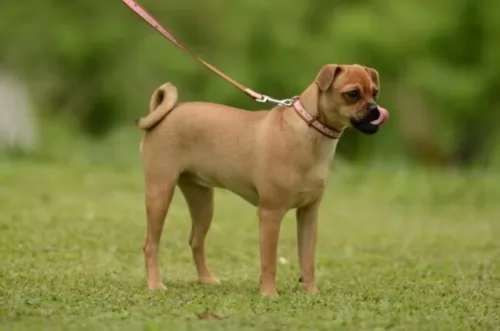 The Muggin is not a purebred dog but rather a cross breed. The hybrid dog population has exploding in the United States in the past ten to fifteen years. A lot of the success of crossbreeding can be attributed to the marketing of these dogs as “Designer Breeds”.
The Muggin is not a purebred dog but rather a cross breed. The hybrid dog population has exploding in the United States in the past ten to fifteen years. A lot of the success of crossbreeding can be attributed to the marketing of these dogs as “Designer Breeds”.
Designer breeds are developed because someone wants some of the characteristics of Breed X and some of the characteristics of Breed Y. Therefore, Designer breed XY is developed. In order to understand this hybrid dog, you need to understand the two purebred breeds they come from. The Muggin is the result of crossing the purebred Pug and the purebred Miniature Pinscher or Min Pin. So, we need to look at the origins of these two purebred breeds.
They are also referred to as Pin Pugs, Min Pin Pug, Pug Pin, Pugscher and were originally the Carlin Pinscher. However, these days there are other breeds besides the Pug and Min Pin making up the gene pool for the Carlin Pinscher. Because of this the Muggin has been separated from the Carlin Pinscher. The American Canine Hybrid Club has accepted the Muggin name for the Pug Min Pin cross.
Pugs are originally a Chinese breed and they were companions rather than working dogs of any kind. During the Han Dynasty they were the dogs of royalty. At the same time there were dogs very much like the pug in Japan and Tibet. The Pugs came to Europe by way of trades with the Dutch who then brought them to Europe. They were named the Mopshond and they caught the eye of the royalty in Europe as well.
Pugs were imported to the United States after the U.S. Civil War and in 1885 they were recognized by the American Kennel Club and called Pugs.
The Min Pin traces its origins to Germany a few hundred years ago. They were “ratters”, guarding the house and stables from all types of vermin. Most dog people believe that the Min Pin is much older than this, perhaps by thousands of years. Yet there is no detailed history to support that. Most believe the breed comes from the German Pinscher line. There might also be some Daschund and Greyhound in that line.
They were once called the Reh Pinscher. This was their name when they came to North America in 1919 and then the breed was renamed in 1972. The Miniature Pinscher Club of America was started in the early 1900’s while the AKC recognized the Min Pin in 1929. Today the Miniature Pinscher is a family dog, a companion.
The Muggin is a loving and loyal dog. All they want is for you to be happy and to share that happiness with them. They can also easily become a one person dog and bond intensely with that one person. They are not a hybrid that you can leave home alone while you go to work for 8 to 10 hours a day. No, the Muggin needs attention and lots of it. Despite this they are great with both kids and other dogs.
Because they are a cross breed, they are not recognized by the American Kennel Club. However, some hybrid registries do recognize the Muggin. These include the Designer Breed Registry, the International Designer Canine Registry, The Designer Dogs Kennel Club, the American Canine Hybrid Club, and the Dog Registry of America.
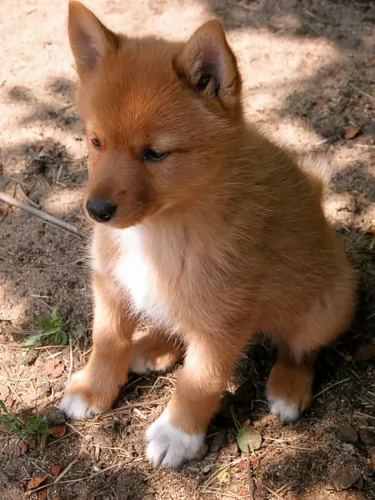 With his wolf-like appearance, the Karelo Finnish Laika is a sharp, intelligent dog and is the smallest Laika in Russia used for hunting. He stands at about 38–48 cm in height and weighs about 11 - 14 kg.
With his wolf-like appearance, the Karelo Finnish Laika is a sharp, intelligent dog and is the smallest Laika in Russia used for hunting. He stands at about 38–48 cm in height and weighs about 11 - 14 kg.
His coat is a reddish color and the fur is fairly long and coarse with a dense, soft undercoat. He looks like a red fox with his sharp, bright face, his erect ears, black nose and bushy tail which curls over the back.
The Karelo-Finnish Laika is a sweet dog with a quiet character. Whenever you suggest a game for him, he throws his docile side to the wind and becomes highly energetic and animated. He is an active dog and loves nothing more than a game with his human family members.
He is mistrustful of strangers, he tends to bark easily and he is territorial and all these characteristic go towards making him a good watchdog. He is quite prepared to live peacefully alongside other dogs in the home, more so when he has been trained and socialized.
He makes a great friend and pet for families and is more than ready to be loving and loyal to his human family.
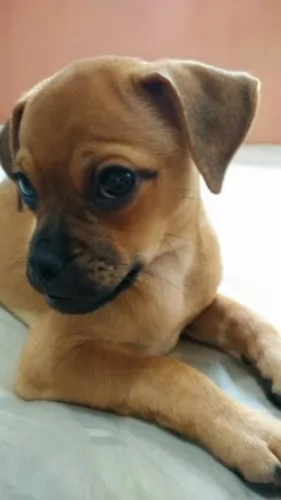 As previously mentioned, the Muggin is a cross between the Pug and the Miniature Pinscher. They are small, shave sturdy legs, floppy ears, and a wrinkled forehead for the most part. Like all hybrids however, all first generation dogs do not look the same. Some might resemble the Min Pin more and others the Pug. Some might have the stockier body of the Pug and the short tail of the Min Pin. Or one could have the Pug’s curly tail and the athletic body of the Min Pin. The snout can be short or long, the ears heavy and floppy or small and thin.
As previously mentioned, the Muggin is a cross between the Pug and the Miniature Pinscher. They are small, shave sturdy legs, floppy ears, and a wrinkled forehead for the most part. Like all hybrids however, all first generation dogs do not look the same. Some might resemble the Min Pin more and others the Pug. Some might have the stockier body of the Pug and the short tail of the Min Pin. Or one could have the Pug’s curly tail and the athletic body of the Min Pin. The snout can be short or long, the ears heavy and floppy or small and thin.
Their coats will usually be fine and short, and colors can vary a lot. They might be black and tan like a Min Pin, or more like a Pug with a solid color of cream, brown, black, white or golden. They also tend to shed quite a bit no matter which parent they take after the most. They will either have brown noses and black eyes or brown eyes and black noses or any combination of black and brown.
If Muggins are only bred to Muggins the second and third generations will resemble each other more than the first generations will. However, at this point many breeders will try to strengthen the breed by occasionally adding in to the gene pool other dog breeds.
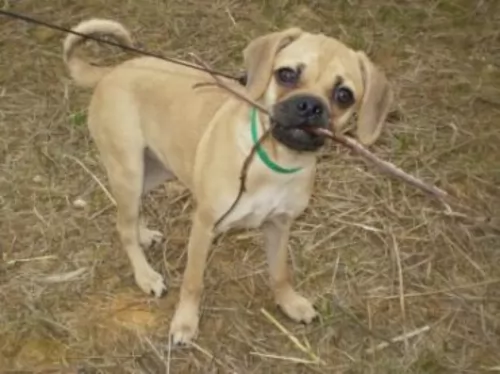 They are good with children but should be supervised.
They are good with children but should be supervised.
Energetic and loving little dogs.
Very adaptable if taken for walks or has space in a yard. Can live anywhere under those circumstances.
Very intelligent but strong willed dog. Needs strong leadership from their person.
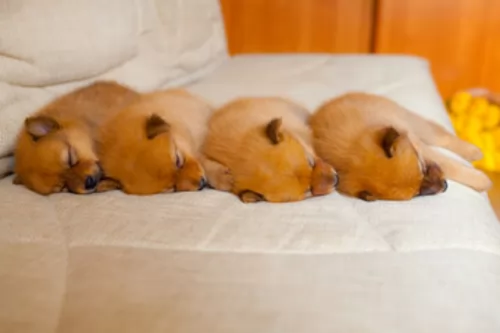 Apart from his good looks, the Karelo-Finnish Laika happens to be a pretty healthy breed and there are no known hereditary health problems with him. Diseases which can affect any dog -
Apart from his good looks, the Karelo-Finnish Laika happens to be a pretty healthy breed and there are no known hereditary health problems with him. Diseases which can affect any dog -
Many large breeds are prone to hip dysplasia. In hip dysplasia, joint problems cause arthritis and pain and eventually lameness. These days, when buying a puppy, people ask breeders about whether the parents were screened for hip dysplasia.
Any dog fed the wrong diet and who isn’t exercised can become overweight. Obesity in dogs is linked to many health problems in dogs. If you’re in doubt about your pet, consult with your vet on the best food for him.
Many dogs are at risk for certain types of cancer, including lymphoma which is cancer of the lymph nodes. When you are brushing your pet, check him for any unusual lumps so that you can catch cancer early.
Dilated cardiomyopathy (DCM) is where the chambers of the heart are stretched out and don't pump blood properly. Sometimes it can go undetected for a while until the dog becomes seriously ill, requiring emergency medical attention. Medications can regulate heart rhythm but there is no cure.
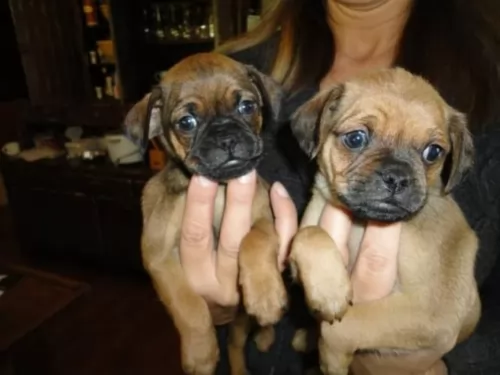 The first generation of Muggins may face all the health issues of either or both their parents, while second and third generations tend to have less health issues, They types of issues the first generation of Muggins might face include:
The first generation of Muggins may face all the health issues of either or both their parents, while second and third generations tend to have less health issues, They types of issues the first generation of Muggins might face include:
Nerve Degeneration – Degenerative Myelopathy or Dm – causes paralysis and eventually fatal.
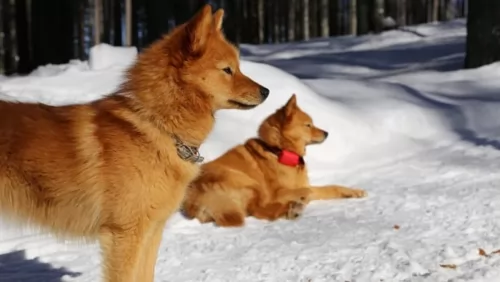 The Karelo-Finnish Laika is a most attractive looking dog and his thick, double coat will need to be brushed at least twice a week to keep it free from dust, grass and burrs. He sheds throughout the year so this brushing will keep the loose dog hair under control.
The Karelo-Finnish Laika is a most attractive looking dog and his thick, double coat will need to be brushed at least twice a week to keep it free from dust, grass and burrs. He sheds throughout the year so this brushing will keep the loose dog hair under control.
Watch your Karelo-Finnish Laika’s diet as a lean, mean dog can live longer than one who is overfed. Dogs which are overweight are likely to develop joint problems and heart disease.
The quality of food you feed your pet is hugely important. Popping chocolates and peanuts into his mouth because you love him so much will be toxic for him. Apart from his top quality dry kibble, add in some cooked chicken, rice and vegetables as a tasty treat and mix in a little bit of raw meat also when you can.
Exercise for your Karelo Finnish Laika is a key component to prolonging his life, and he absolutely loves games, walks and action all the way. It will keep him in shape, keep him happy and prolong his life.
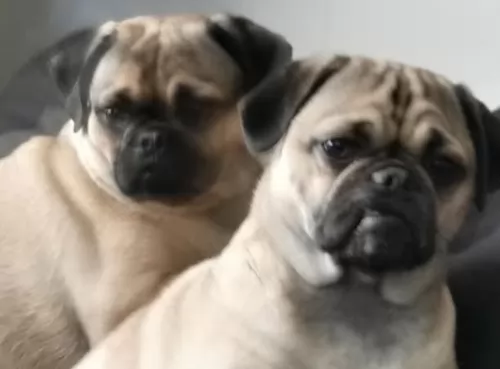 This crossbreed has a definite propensity to overeat and become obese from puppyhood. Feed the puppy a small dog dry food 3-4 times a day a total of ¾ of a cup to 1 cup.
This crossbreed has a definite propensity to overeat and become obese from puppyhood. Feed the puppy a small dog dry food 3-4 times a day a total of ¾ of a cup to 1 cup.
Again don’t over feed the adult Muggin or he will become obese easily. Feed at least twice a day one to one and half cups total.
High Energy
With the athleticism of the Min Pin taking precedence over the less active Pug, the Muggin is a fairly active dog. The Muggin is also not effective by the Pug’s difficulty with heat and cold. They love to go on long walks and need exercise to keep from being bored and destructive. However, remember there is a Pug in your Muggin and if she is not into exercise don’t try to get her to do more than she can.
You do want your Muggin to get enough exercise to fend off any tendency to be overweight. They are good at agility, jogging, obedience and watchdog activities.